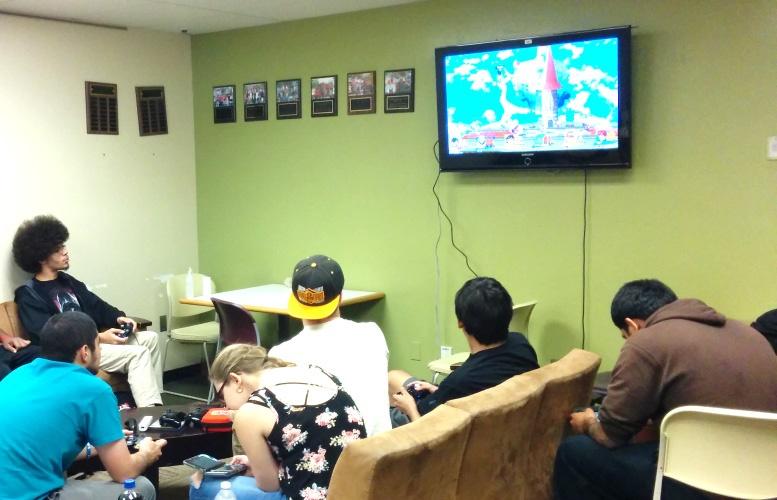Gaming to your degree: The rise of E-sports
E-sports may have more benefits than many realize
Cody Achin/Scottsdale Chronicle
A group of SCC students relieve stress after classes by playing video games.
April 23, 2016
The debate whether E-sports deserves to be called a sport or if E-sports should be on TV is a bit overdone.
Either way, E-sports is growing to be one of the biggest spectator and gaming platforms so far. According to Magus for the League of Legends Championship Series newsletter, LOL alone brought in 334 million viewers during the 2015 World Championships. Whether you are for or against E-sports, it is a growing industry causing our generation to look at E-sports as a legitimate way to earn money, get into the gaming industry and even to get through college.
Last year, developer Blizzard held a tournament across the United States and Canada for their game, “Heroes of the Storm,” and was a competition between all the major universities for a chance to have their college careers paid for the next four years. Arizona State University and University of California Berkeley went to the finals with ASU coming in second place. This was the first time an E-sport game was televised on a national channel in the U.S. Nick Wingfield’s article in the New York Times, “E-Sports at College, With Star and Scholarships,” explains that some colleges across the U.S. have already established E-sport programs so that students have a chance to earn college tuition, either from the school itself or through competition between universities.
This leads many to question if E-sports can actually help students with their classes.
At SCC, there is an Electronic Gaming Club. On the SCC web page for clubs and organizations, the description for this club is “to enhance social interactions through the use of electronic medium known as video games.” The advisor for this club, Gerald Thurman, is a computing and math instructor at SCC. He feels that video games will have positive effects on students and could possibly solve many real world problems.
“It’s possible gamers will become major contributors in solving humanity’s top ten problems for the next couple of decades,” Thurman said. “It has to do with their mindset and ability to go after epic wins.”
Thurman believes that E-sports are a good way to learn many subjects in universities.
“More and more schools are using gaming to help students learn various subjects,” Thurman said. “Play to learn.”
A graduate of South Mountain Community College, Justisse Mulligan, feels that if E-sports were to help students go into that profession, then it should be in schools.
“The goal of an educational system is supposed to be teaching people skills and if somehow [E-sports] does benefit the students, then yes,” Mulligan said.
Kyle Flores, a Fine Arts major at SCC, considers himself to be an avid gamer. He explains that although the actual ability to play the games won’t help with your classes, game mentality and agility can definitely be applied to classes and a degree “because of how much thinking it takes just to play [Multiplayer Online Battle Arena] games.”
“There’s a lot of thinking involved,” Flores said. “It’s like chess, finding ways to gain their objective.”
The idea of E-sports being part of a university’s curriculum is still in its infancy. For now, E-sports is a growing into a normal aspect of college life. However, there could be a time soon enough that one could apply to get their tuition paid for by playing games.


